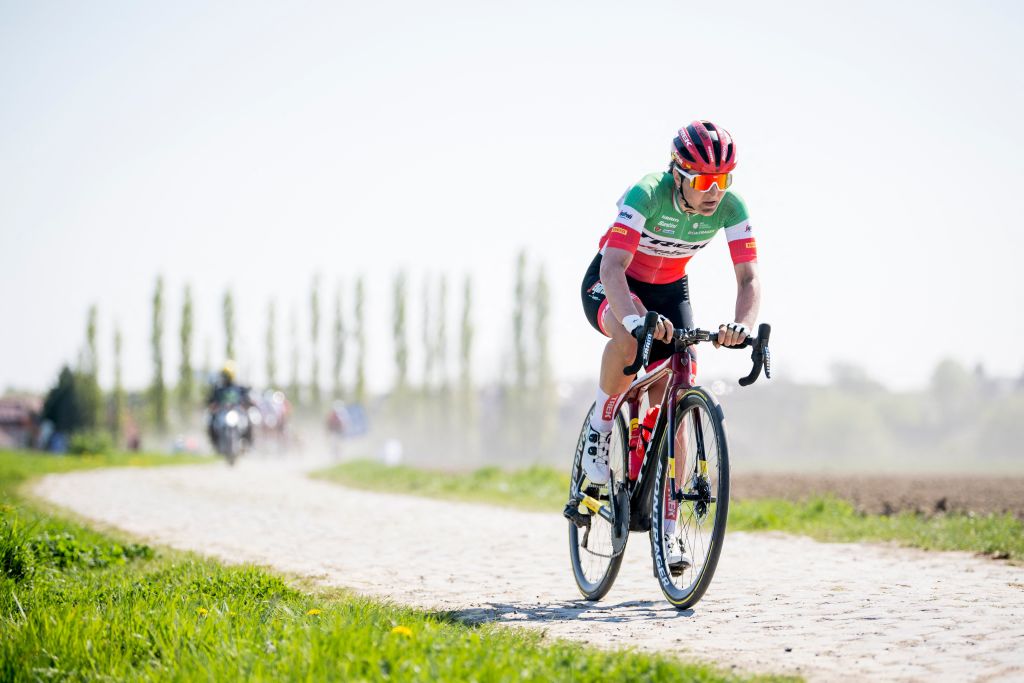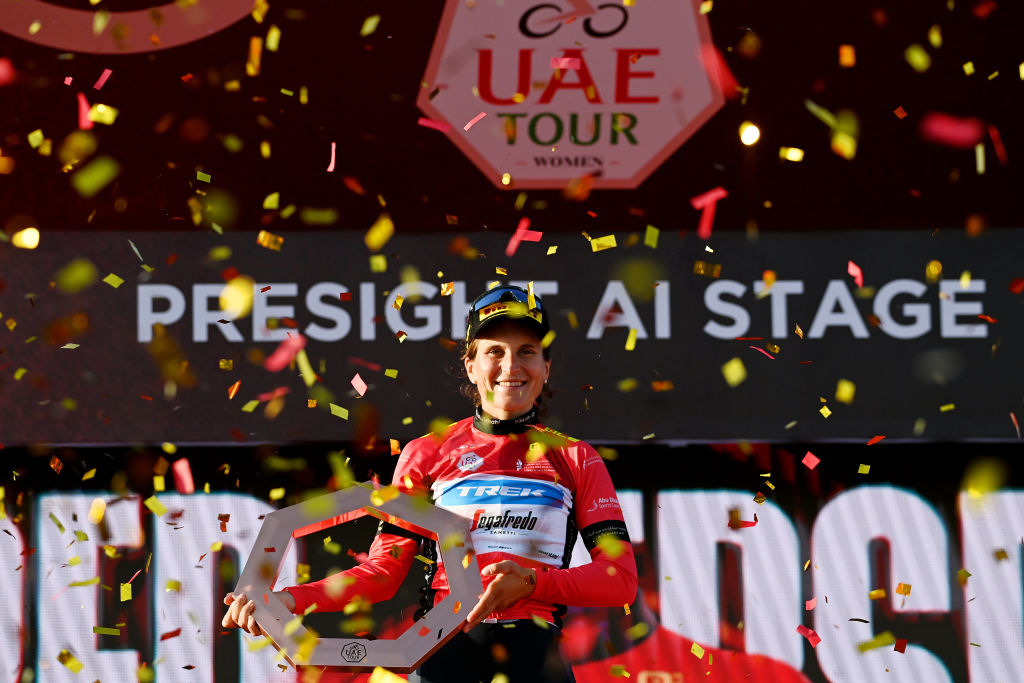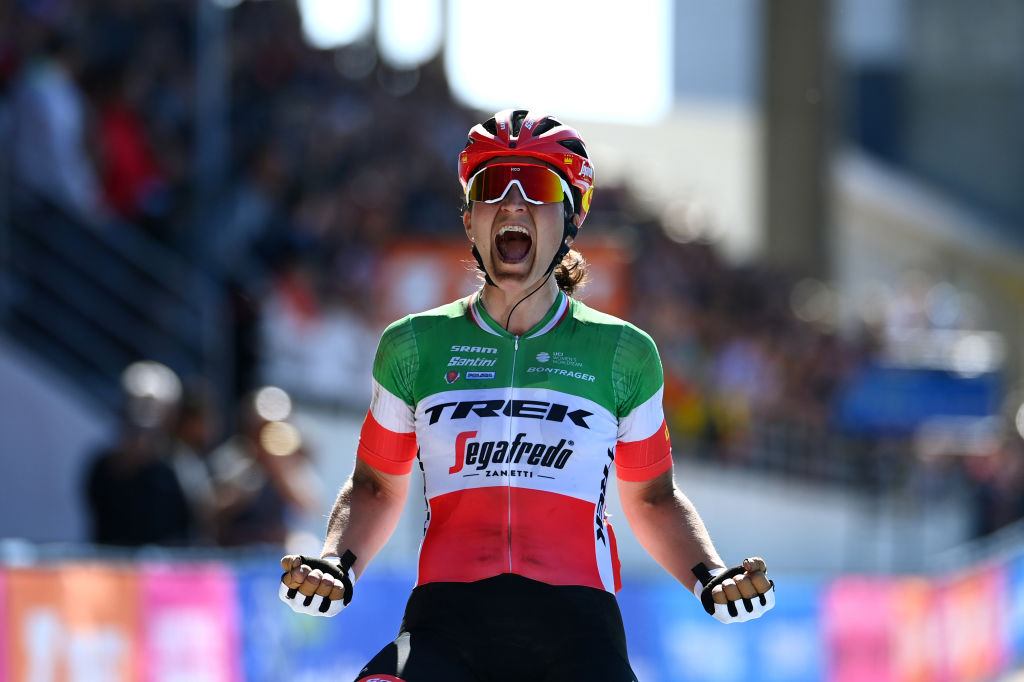Elisa Longo Borghini's secret to success: Think less, ride like there's no tomorrow
Italian reveals her strategy for races like Tour of Flanders, Paris-Roubaix and Tour de France Femmes

When Elisa Longo Borghini is asked how much last-minute thinking was involved in launching her race-winning attack in the 2022 edition of Paris-Roubaix, 34 kilometres from the line, she has an answer that’s very simple and very complicated at the same time.
"Zero. Nothing," she tells Cyclingnews. "At the precise moment that I attacked, I simply said to myself: 'OK, see you all in Roubaix.' In my head, I was just thinking - I want to win this race."
Breaking away for the biggest triumph of her career wasn’t completely a heat-of-the-moment impulse, though. Rather, Longo Borghini says - and this is contrary to a lot of professionals' experience - the longer she's raced, the more she's learned how to stop calculating what her odds of success are before making a move.
"It's really interesting because I used to think more when I was younger," she says. "I was maybe less convinced about my potential. But then, when I realised I could win races, I was like, 'ok, let's go for it.'
"Sometimes, when you think less and ride your bike like there’s no tomorrow, you end up winning. Sometimes you end up doing stupid stuff, of course. But on the other hand, there are races like last year’s Paris-Roubaix, too."
Longo Borghini’s hell-bent-for-leather attitude to racing has also served the 31-year-old Italian well in other ways. With 37 wins in races ranging from the Tour of Flanders, Strade Bianche and Paris-Roubaix to Trofeo Alfredo Binda, the now-defunct Emakumeen Bira and the Route de France, she’s developed a fearsome reputation for one of the most complicated challenges any rival can face: unpredictability.
As she puts it to Cyclingnews, "If my enemies don’t know when I am going to attack, then maybe it's an advantage because they never know what I'm going to do. I'm very instinctive. Although, of course, having such a strong team to back me helps me too."
Get The Leadout Newsletter
The latest race content, interviews, features, reviews and expert buying guides, direct to your inbox!
But however powerful her Trek-Segafredo team may be, and however deep her trust in her instincts when racing, Longo Borghini holds yet another trump card. When training, she pays close attention to the numbers and data she's producing, she says, even if when racing, those stats tend to be the first thing she'll ignore.
"I think it's part of our job to be really focussed on your training and so on because then you have to go into the race, and for me, it's the complete opposite," she explains. "You start a race with a plan as a team, but if you are a leader, you need those race instincts. They are what brings you to victory."
But for all her deliberately impulsive in-race attitude, a certain degree of anticipation is involved as well, she admits - that's the moment when you wake up on a race day with an inexplicable inner certainty that you will be in with a greater-than-usual chance of a win.
"Sometimes you have those days, I don't know why, you don't know why, nobody knows why," she says, "but you're just convinced you're going to do something big.
"At the end of it all, that feeling doesn't mean you'll actually win the race, maybe it'll just be a good show. I think this kind of spectacle is what the public wants, and I also like to entertain people. For me is the beauty of being an athlete: to put on a good show."
By way of example, she cites the case of the Ceratizit Challenge by La Vuelta last year. She finished second there and didn't take a single stage. But her determination throughout to give her rivals a run for their money and the crowds left her with a notable feeling of pride in what she achieved - and confirmation that even in her early 30s, rather than limiting her goals as retirement slowly approaches, she could still try and raise the bar a little more in new cycling specialties.
"There was a stage [stage 2 to Colindres - Ed.] where I got second, but I still won the sprint against Liane Lippert and Demi Vollering," she recounts. "That never usually happens because I'm quite a slow rider in sprints, but I did my 110%, I did my best, and I was really pleased with that.
"So that's another string to my bow maybe - or maybe not, but it's something to experiment with at least, and so I made a big step. And next time, if there's five of us in a sprint, maybe I can get third and not fifth as I did in the previous years."
The luck of having strong opponents

It's perhaps a testament to her refusal to set a limit on her ambitions that she doesn’t ever let her rivals intimidate her. Asked about the seemingly unstoppable domination of Annemiek van Vleuten last year, for example, she argues that rather than being unfortunate to have to race against the Dutchwoman, "I think I've been lucky to have strong opponents, I like to have them." Is that because the better they are, the better the feeling when you beat them? "Yes, exactly."
Yet so far, in any case, the Trek-Segafredo rider has shown one vital constant throughout her career: her versatility when it comes to winning, which remained very much intact in the first part of 2023.
This February, for example, Longo Borghini won the UAE Tour Women, including a stage victory on Jebel Hafeet. And she rejects the idea that mixing up goals as different as Paris-Roubaix and top performances in stage races like UAE could be beyond her in the future, either. But rather than instinct, this is where her proven capacity for careful calculation comes to the fore.
"It's possible to combine events like Paris-Roubaix and the Tour; you have to prioritize, look at your objectives, go for it with specific preparation and good periods of rest," she explains.
"I'm very consistent, and that enables me to focus well. Resting and knowing how to recover is very important for the head - as much, if not more, than it is for the legs. I'm lucky because being with my family is a huge part of that for me. I can take things calmly when I'm with them, slow things down and come back feeling even better.
"At a nervous level, Paris-Roubaix soaks up a lot of your energy because the level of tension it involves is so high, riding across one sector of cobbles after another. And although I did the Ardennes last year, after all that emotion and effort in Roubaix, I was going well, but not great.
"But I did some races in May, then stopped to rest and went for training and altitude for the summer, and it was really good. And that's how you do it: you have to learn how to regulate things, how to spread things out."
Given the importance of her family when it comes to the recovery process on a mental level, she says it's only appropriate that the Paris-Roubaix cobble trophy from 2022 is currently 'residing' in her parents' home. As she puts it, "that makes me happy because all the good results I've had are thanks to them and wouldn't have been possible without them, so it's nice to know it's there. I'm happy they've got it."
Probably contributing to that feeling of satisfaction, too, is what Longo Borghini describes as the "fascination" of Paris-Roubaix itself.
"That's what makes it so different, the history that it has, thinking that 50 years ago, people were already racing across those sectors of cobbles on old, iron bikes and heavy wheels. Compared with the great, super-sophisticated bikes we have now and know about the difference between them and what came before is really something special. That explains part of the fascination of Paris-Roubaix, too, why it's very special and prestigious, and the pride you feel when you win it is something incredible."
And for 2023?

The chances of Longo Borghini making it two Paris-Roubaix wins out of two, though, are a little more uncertain after she caught COVID-19 this March. The most important thing post-COVID, she tells Cyclingnews, is that she got a green light on all the health checks on her heart, lungs and blood values that she needed to return to competitive racing. But beyond that knowledge, exactly how she will perform in Flanders and Roubaix will likely be another voyage in the dark, particularly as this is the first time she's gone down with COVID.
"I didn't cough or sneeze more than twice," she said earlier this week, "but I was positive for COVID for a really long time, and I got a fever for about 10 days, and I felt really tired afterwards.
"Right now, I feel OK, but so far, I have just worked on my base training, nothing over or even on the threshold.
"I will use these upcoming races as the final part of the last preparation, to just do some all-out efforts. I need to be there for my team and my teammates, working for them, and see how my body reacts.
"But I don't really know how I am. As a human being, I feel good. But as for how I feel as an athlete, I don't know. Before Dwars" - where she took a promising 11th and was active in the finale - "my previous race was [Omloop het] Nieuwsblad in February, and that was a month ago."
COVID is a deeply unpredictable illness, she points out, and that makes it necessary for her to take things step by step. But as she puts it, too, for now, she's just happy to be back in the peloton with a race number on her back.
"Sometimes you have to accept things happen," she concludes, "you have to deal with them, this is cycling, and you have to cope with it. Maybe there is something nice in the future for me, and I was not sad that I had to watch Strade [Bianche] because I was not in a good place at that point, COVID really struck me down hard.
"But we'll see. If I feel good, to be honest, you'll see me somewhere at the top of the [results] list at the end of the race. If I don't feel good, I'll just work for the others. But at least COVID is over, and that's good."
So Longo Borghini's strategy in the 2023 editions of the Tour of Flanders and, above all, Paris-Roubaix will likely come down once again to her race instincts. But given how well trusting her feelings in races has served Longo Borghini in the past, that may not be such a bad thing, after all.
Alasdair Fotheringham has been reporting on cycling since 1991. He has covered every Tour de France since 1992 bar one, as well as numerous other bike races of all shapes and sizes, ranging from the Olympic Games in 2008 to the now sadly defunct Subida a Urkiola hill climb in Spain. As well as working for Cyclingnews, he has also written for The Independent, The Guardian, ProCycling, The Express and Reuters.
